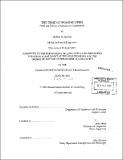| dc.contributor.advisor | Irene Heim. | en_US |
| dc.contributor.author | Ippolito, Michela M., 1970- | en_US |
| dc.contributor.other | Massachusetts Institute of Technology. Dept. of Linguistics and Philosophy. | en_US |
| dc.date.accessioned | 2009-01-23T16:40:22Z | |
| dc.date.available | 2009-01-23T16:40:22Z | |
| dc.date.copyright | 2002 | en_US |
| dc.date.issued | 2002 | en_US |
| dc.identifier.uri | http://dspace.mit.edu/handle/1721.1/8153 | en_US |
| dc.identifier.uri | http://hdl.handle.net/1721.1/8153 | |
| dc.description | Thesis (Ph. D.)--Massachusetts Institute of Technology, Dept. of Linguistics and Philosophy, 2002. | en_US |
| dc.description | Includes bibliographical references (p. 191-194). | en_US |
| dc.description.abstract | This dissertation is a study of modality and, in particular, of conditional statements within the framework of possible world semantics. I argue that in order to understand what the meaning of a modal sentence is we need to look closely at the internal composition of accessibility relations. Accessibility relations are shown to be complex relations involving both a world and a time of evaluation, and it is shown that temporal and aspectual operators can be interpreted in the modal domain, and may not occur inside the scope of the modal operator. When interpreted in this position, temporal and aspectual operators contribute to the selection of the possible worlds by defining the relevant notion of accessibility. Capitalizing on work by Irene Heim, David Lewis and Robert Stalnaker, I show that this proposal allows us to develop a semantic analysis of those conditionals that are traditionally called subjunctive conditionals, and to provide an answer to how to select the worlds that the modal operator quantifies' over. Finally, I argue that the semantic analyses of counterfactuals discussed by Lewis (1979) - Analysis 1 and Analysis 2 - cannot be maintained in that neither of them accounts for the contrast between the felicity conditions of different types of subjunctive conditionals. Instead, I will argue that our theory based on a time-dependent notion of accessibility can. | en_US |
| dc.description.statementofresponsibility | by Michela M. Ippolito. | en_US |
| dc.format.extent | 194 p. | en_US |
| dc.language.iso | eng | en_US |
| dc.publisher | Massachusetts Institute of Technology | en_US |
| dc.rights | M.I.T. theses are protected by
copyright. They may be viewed from this source for any purpose, but
reproduction or distribution in any format is prohibited without written
permission. See provided URL for inquiries about permission. | en_US |
| dc.rights.uri | http://dspace.mit.edu/handle/1721.1/8153 | en_US |
| dc.rights.uri | http://dspace.mit.edu/handle/1721.1/7582 | en_US |
| dc.subject | Linguistics and Philosophy. | en_US |
| dc.title | The time of possibilities : truth and felicity of subjunctive conditionals | en_US |
| dc.type | Thesis | en_US |
| dc.description.degree | Ph.D. | en_US |
| dc.contributor.department | Massachusetts Institute of Technology. Department of Linguistics and Philosophy | |
| dc.identifier.oclc | 51870151 | en_US |
